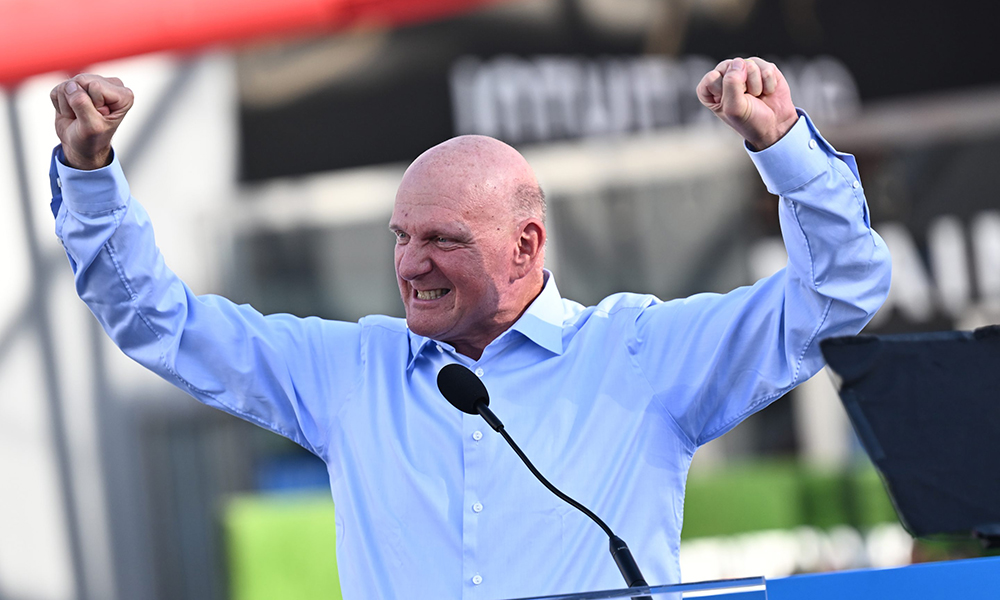
•史蒂夫·鲍尔默并未将投资分散于多个领域。相反,他的投资组合几乎完全依赖于微软(Microsoft)股票。这位微软前首席执行官敦促散户投资者保持简单。
微软前首席执行官史蒂夫·鲍尔默认为,大多数投资者应遵循简约原则,他个人的投资组合也极为简单,几乎完全依赖于单一股票。
据《华尔街日报》报道,在史蒂夫·鲍尔默的投资组合中,微软股票占比超过80%,其余部分是股票指数基金。
他在周日发表的《华尔街日报》问答中表示:“微软的表现几乎超越了我能拥有的所有其他资产。显而易见的是,这项策略取得了巨大的成功。”
包括股息在内,微软近年来的年平均回报率约为29%,而标准普尔500指数的平均回报率约为13%。
这得益于微软支持的OpenAI所掀起的人工智能热潮。自2022年11月ChatGPT发布以来,微软的股价一路飙升,市值超过3万亿美元。
曾在2000年至2014年间担任微软首席执行官的鲍尔默透露,他的投资理念受到沃伦·巴菲特(Warren Buffett)建议的影响:对于散户投资者而言,相较于试图战胜市场,投资标准普尔500指数基金可能更为明智。
诚然,这位伯克希尔·哈撒韦公司(Berkshire Hathaway)的首席执行官并未将其80%的投资组合集中在单只股票上。然而,鲍尔默在未能找到能够持续跑赢市场的基金经理后,最终确定了这一不同寻常的投资策略。
根据彭博亿万富翁指数的统计,鲍尔默目前的身价为1510亿美元。他在接受《华尔街日报》采访时表示,他和妻子已将指数基金的投资方向调整为只专注于美国和欧洲,同时“可能”持有部分日本资产。此外,他还退出了私募股权投资,只关注头号控股公司微软。
“我喜欢这种方式。这很简单,"他补充道。“我们的财务状况一直很好。在这种情况下,我所追求的是无需在某个领域投入过多时间、承受不必要的焦虑以及耗费大量脑力。如果我们能够获得7%的回报率就已经很幸运了,因为这是标准普尔指数的长期平均回报率。”
至于他持有哪只指数基金,鲍尔默显得有些不确定,他说如果不是标准普尔500指数基金,那就是小盘股罗素2000指数基金,或是“某种反映市场整体状况的基金”。
与此同时,他的另一项重大投资——洛杉矶快船队(Los Angeles Clippers)——似乎也表现不俗。他在2014年以20亿美元的价格买下了NBA特许经营权,根据《福布斯》的数据,目前其价值已攀升至55亿美元。
当被问及他的投资策略是否适用于普通投资者时,他回答说:"我会说,‘保持简单’——除非你打算成为这个领域的专家。”
研究显示,追踪标准普尔500指数的指数基金的表现始终优于大多数主动管理型基金,尤其是近期美国资产在全球市场占据主导地位的情况下。
晨星公司(Morningstar)7月份的数据显示,过去10年里,跑赢标准普尔500指数的主动型基金的平均比例为27%。此外,分散投资于不同资产类别和地域的基金表现也未能超越标准普尔500指数。Cambria Funds 6月份的数据显示,在过去15年中,这类投资组合有13年的表现落后于标准普尔500指数。
毋庸置疑的是,近期标准普尔500指数的绝大部分涨幅来自微软和英伟达(Nvidia)等少数几家科技巨头,这使得指数投资者很容易受到单一股票下跌的影响。
与此同时,华尔街的怀疑论者认为,美国市场在全球投资者中占据压倒性优势是一个危险信号。
洛克菲勒国际(Rockefeller International)董事长鲁奇尔·夏尔马(Ruchir Sharma)本月早些时候在《金融时报》上写道:“关于科技或人工智能领域泡沫,或是专注于增长和动量投资策略泡沫的讨论,掩盖了美国市场的泡沫之母。美国彻底主宰了全球投资者的思维空间,导致其被过度持有、高估和炒作,且达到了前所未有的程度。”(财富中文网)
译者:中慧言-王芳
•史蒂夫·鲍尔默并未将投资分散于多个领域。相反,他的投资组合几乎完全依赖于微软(Microsoft)股票。这位微软前首席执行官敦促散户投资者保持简单。
微软前首席执行官史蒂夫·鲍尔默认为,大多数投资者应遵循简约原则,他个人的投资组合也极为简单,几乎完全依赖于单一股票。
据《华尔街日报》报道,在史蒂夫·鲍尔默的投资组合中,微软股票占比超过80%,其余部分是股票指数基金。
他在周日发表的《华尔街日报》问答中表示:“微软的表现几乎超越了我能拥有的所有其他资产。显而易见的是,这项策略取得了巨大的成功。”
包括股息在内,微软近年来的年平均回报率约为29%,而标准普尔500指数的平均回报率约为13%。
这得益于微软支持的OpenAI所掀起的人工智能热潮。自2022年11月ChatGPT发布以来,微软的股价一路飙升,市值超过3万亿美元。
曾在2000年至2014年间担任微软首席执行官的鲍尔默透露,他的投资理念受到沃伦·巴菲特(Warren Buffett)建议的影响:对于散户投资者而言,相较于试图战胜市场,投资标准普尔500指数基金可能更为明智。
诚然,这位伯克希尔·哈撒韦公司(Berkshire Hathaway)的首席执行官并未将其80%的投资组合集中在单只股票上。然而,鲍尔默在未能找到能够持续跑赢市场的基金经理后,最终确定了这一不同寻常的投资策略。
根据彭博亿万富翁指数的统计,鲍尔默目前的身价为1510亿美元。他在接受《华尔街日报》采访时表示,他和妻子已将指数基金的投资方向调整为只专注于美国和欧洲,同时“可能”持有部分日本资产。此外,他还退出了私募股权投资,只关注头号控股公司微软。
“我喜欢这种方式。这很简单,"他补充道。“我们的财务状况一直很好。在这种情况下,我所追求的是无需在某个领域投入过多时间、承受不必要的焦虑以及耗费大量脑力。如果我们能够获得7%的回报率就已经很幸运了,因为这是标准普尔指数的长期平均回报率。”
至于他持有哪只指数基金,鲍尔默显得有些不确定,他说如果不是标准普尔500指数基金,那就是小盘股罗素2000指数基金,或是“某种反映市场整体状况的基金”。
与此同时,他的另一项重大投资——洛杉矶快船队(Los Angeles Clippers)——似乎也表现不俗。他在2014年以20亿美元的价格买下了NBA特许经营权,根据《福布斯》的数据,目前其价值已攀升至55亿美元。
当被问及他的投资策略是否适用于普通投资者时,他回答说:"我会说,‘保持简单’——除非你打算成为这个领域的专家。”
研究显示,追踪标准普尔500指数的指数基金的表现始终优于大多数主动管理型基金,尤其是近期美国资产在全球市场占据主导地位的情况下。
晨星公司(Morningstar)7月份的数据显示,过去10年里,跑赢标准普尔500指数的主动型基金的平均比例为27%。此外,分散投资于不同资产类别和地域的基金表现也未能超越标准普尔500指数。Cambria Funds 6月份的数据显示,在过去15年中,这类投资组合有13年的表现落后于标准普尔500指数。
毋庸置疑的是,近期标准普尔500指数的绝大部分涨幅来自微软和英伟达(Nvidia)等少数几家科技巨头,这使得指数投资者很容易受到单一股票下跌的影响。
与此同时,华尔街的怀疑论者认为,美国市场在全球投资者中占据压倒性优势是一个危险信号。
洛克菲勒国际(Rockefeller International)董事长鲁奇尔·夏尔马(Ruchir Sharma)本月早些时候在《金融时报》上写道:“关于科技或人工智能领域泡沫,或是专注于增长和动量投资策略泡沫的讨论,掩盖了美国市场的泡沫之母。美国彻底主宰了全球投资者的思维空间,导致其被过度持有、高估和炒作,且达到了前所未有的程度。”(财富中文网)
译者:中慧言-王芳
• Steve Ballmer doesn’t diversify his investments. Instead, his portfolio is almost entirely dependent on Microsoft stock. The former Microsoft CEO urged retail investors to keep things simple.
Former Microsoft CEO Steve Ballmer believes most investors should keep things simple, and his own holdings are so simple they depend overwhelmingly on just one stock.
According to the Wall Street Journal, more than 80% of his investment portfolio is in Microsoft stock with the rest in stock index funds.
“Microsoft’s outperformed just about every other asset I could have owned,” he told the Journal in a Q&A that was published on Sunday. “It’s a little hard to say that it hasn’t worked out.”
Including dividends, Microsoft has returned an average of about 29% annually in recent years, while the S&P 500 has returned about 13% on average.
That was helped by the AI boom that was launched by Microsoft-backed OpenAI. Since the release of ChatGPT in November 2022, Microsoft’s stock price has soared, vaulting its market cap above $3 trillion.
Ballmer, who served as Microsoft’s boss from 2000 to 2014, said his philosophy was shaped by Warren Buffett’s advice that retail investors are better off parking their money in an S&P 500 index fund rather than trying to outsmart the market.
Of course, the Berkshire Hathaway CEO doesn’t have 80% of his portfolio in one stock. But Ballmer settled on his unusual investment strategy after having trouble finding money managers who regularly beat the market.
Now worth $151 billion on the Bloomberg Billionaires Index, he told the Journal that he and his wife shifted an index fund to be just the U.S. and Europe while they “maybe” own some Japanese assets too. He’s also getting out of private equity and only really follows top holding Microsoft.
“I like it. It’s simple,” he added. “We’ve been very blessed financially. What I seek in this instance is not to have to spend a lot of time, anxiety, brain power in an area where we’re blessed enough if we make 7% because that’s the standard return on the S&P over the long run.”
As far as which index fund he owns, Ballmer sounded uncertain, saying if it’s not the S&P 500, then it’s the small-cap Russell 2000 or “some broad mirror of the market.”
Meanwhile, his other big investment—the Los Angeles Clippers—also appears to be doing well. He bought the NBA franchise in 2014 for $2 billion, and it’s now worth $5.5 billion, according to Forbes.
When asked if his strategy can apply to everyday investors, he replied, “I would say, ‘Keep it simple’—unless you’re really going to become an expert.”
Studies have shown index funds tracking the S&P 500 consistently beat most actively managed funds, especially as U.S. assets have reigned supreme in global markets lately.
Over the past 10 years, the average share of active funds that beat the S&P 500 was 27%, according to Morningstar data from July. In addition, funds that are diversified across asset classes and geographies also fared worse than the S&P 500. Such portfolios have lagged the index in 13 of the last 15 years, according to data from Cambria Funds in June.
To be sure, the vast majority of the S&P 500’s recent gains have come from just a handful of tech giants, such as Microsoft and Nvidia, leaving index investors vulnerable to a single-stock drop.
Meanwhile, skeptics on Wall Street see the overwhelming dominance of U.S. markets among global investors as a red flag.
“Talk of bubbles in tech or AI, or in investment strategies focused on growth and momentum, obscures the mother of all bubbles in U.S. markets,” Ruchir Sharma, chair of Rockefeller International, wrote in the Financial Times earlier this month. “Thoroughly dominating the mind space of global investors, America is over-owned, overvalued, and overhyped to a degree never seen before.”






